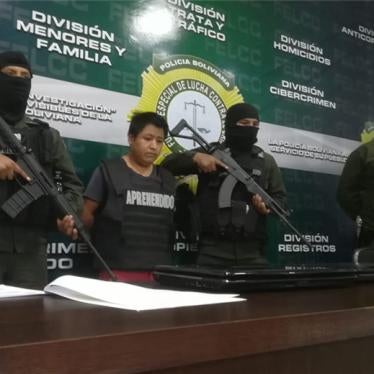(Washington, D.C.) — The findings of Peru's Truth and Reconciliation Commission underscore the need to prosecute the perpetrators of gross human rights abuses, Human Rights Watch said today.
The commission's nine-volume report, made public this morning, concludes that more than 60,000 people died or "disappeared" in the guerrilla war that ravaged Peru during the 1980s and 1990s.
"These figures far exceed previous estimates," said José Miguel Vivanco, executive director of Human Rights Watch´s Americas Division. "They reveal the utter brutality of the insurgency in Peru, as well as the repressiveness of the measures that were taken to contain it."
Shining Path, a Maoist guerrilla group, killed about half the victims, and roughly one-third died at the hands of government security forces, according to the report. The commission attributed some of the other slayings to a smaller guerrilla group and local militias. The rest remain unattributed.
The violence peaked in 1983 and 1984 in Ayacucho, one of Peru's poorest provinces. Both guerrillas and security forces massacred civilians indiscriminately. Three-quarters of the victims named in the report were Quechua-speaking Indians, the poorest and most exploited sector of Peruvian society.
The commission will reportedly turn over a number of cases to the attorney general's office for prosecution. It did not name the suspected perpetrators, but recommended that their names be made public if Peru's attorney general fails to carry out prompt and exhaustive investigations of the cases.
"The real test of Peru's willingness to confront its abusive past lies in how the government handles the question of prosecutions," Vivanco said. "The world will be watching to see if the attorney general puts the necessary effort into investigating and prosecuting these cases."
President Valentín Paniagua formed the Commission of Truth and Reconciliation in June 2001. Its mandate was threefold: to provide an official record of violations of human rights and international humanitarian law committed between May 1980 and November 2000; to analyze their causes, and to recommend measures to strengthen human rights and democracy.
The commission collected 17,000 testimonies and interviewed political leaders, legislators, army generals and former guerrilla leaders now in prison. It also held public hearings in regions of the country most affected by the conflict. The hearings were broadcast on television.
The report identified more than 1,000 sites thought to contain victims' bodies. It urged the government to provide more resources to enable the prosecutor's office to exhume and identify remains.
"The report's release is a major step forward for Peru, but it also shows how much remains to be done to end years of impunity for human rights abuses," said Vivanco. "The Toledo administration should act now to ensure that the commission's recommendations are fully implemented."






